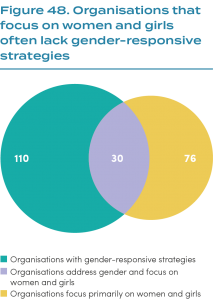Gender in programmatic strategies: too little recognition that gender drives health outcomes
Ensuring gender equality in health requires gender-responsive analysis and gender-transformative planning, investment and programming to promote changes in the norms and power dynamics that influence the health and wellbeing of women, men and transgender people.
Approximately 60% of organisations (110/186) mention gender in their strategic and programming documents. This marks a sizeable increase over 2018, when 45% of organisations were found to have gender-responsive strategies in place.
Seventy-seven (41%) organisations focus predominantly on the health of women and girls, and the majority of them (47/76) do so without explicitly adopting a gender-responsive approach.


